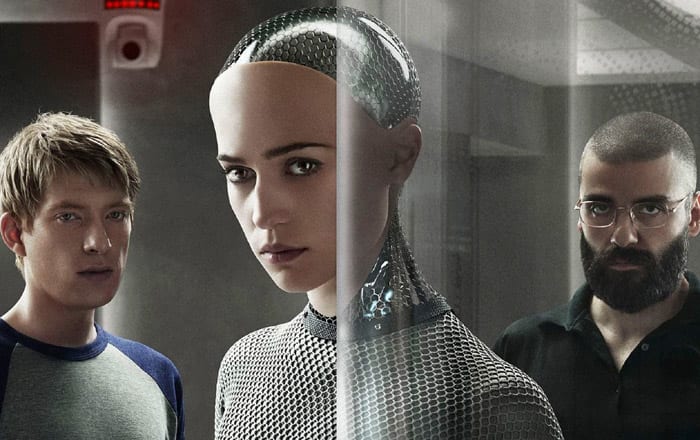
Written by Adam Mast
‘Ex Machina’
Alex Garland’s “Ex Machina” is an outstanding, meditative sci-fi tale about a scientist playing God, but this haunting film cuts a whole lot deeper. There’s so much subtext running through this provocative look at artificial intelligence that I would have given anything if just the smallest percentage of it had been injected into the new “Avengers: Age of Ultron” movie.
I fully recognize that “Age of Ultron” is designed to be a huge spectacle of a thrill ride, but a little more Ultron character depth could have made a huge difference in the overall effectiveness of that particular movie. Having said that, we’re not here to talk about “The Avengers.” We’re here to talk about “Ex Machina,” so let’s jump right into it.
In “Ex Machina,” computer coder Caleb (played by Domhnall Gleeson) is picked out of a handful of brilliant minds to assist eccentric genius Nathan (played by Oscar Isaac) in an effort to test a breakthrough artificial intelligence program in a high-tech lab located in a secluded (and very private) mountain retreat. The A.I. at the heart of this film is no ordinary looking program though. This A.I. appears in the form of Ava (played by the lovely Alicia Vikander), a skillfully constructed robot born of fiber optics and possibly, a soul. As Caleb spends a week interviewing Ava for signs of self-awareness, he is not only intoxicated by his conversations with her, but he soon begins to realize that Ava might not be the only test subject in Nathan’s lab.
“Ex Machina” is a quiet movie, and while its deliberate pacing might be maddening for some, I found it to be intriguing and thought provoking. It takes many of the ideas incorporated in outstanding sci-fi epics like “Blade Runner,” “2001,” and “A.I.” and grounds them in a more intimate, reality-based locale.
Garland (the screenwriter behind “28 Days Later” and “Sunshine”) touches on everything from gender politics to sexuality to female empowerment to Orwellian Big Brother scenarios here, and the end result is a sci-fi tale that has a tone akin to something like Andrew Niccol’s “Gattaca” and even “Splice.” Granted, “Ex Machina” never really turns into a straight up horror movie as was the case with Vincenzo Natali’s under appreciated monster flick. With its fierce and often brutal dissection of certain aspects of human nature, there were times when “Ex Machina” also reminded me of a Neil LaBute morality play (think of “Ex Machina” as “In the Company of Robots”).
Despite its darker, more provocative moments though, Garland finds plenty of time for humor. Be it the “Ghostbusters” and “Star Trek” references or a positively hilarious sequence in which Nathan boogies on the dance floor to the rhythmic beats of a disco tune, “Ex Machina” isn’t afraid to let its hair down on occasion, and this keeps the film from turning into a mere artsy message movie.
The three leads here are terrific. Isaac (“Inside Llewyn Davis” and soon to be seen in “The Force Awakens”) in particular is perfectly mysterious as a seemingly shifty but intellectual Nathan. He’s funny and brilliant, but those crazy eyes of his suggest a potentially dangerous individual who you wouldn’t necessarily want to meet up with in a dark alley somewhere. The lovely Vikander (“Seventh Son” and soon to be seen in “The Man From U.N.C.L.E.”) brings a childlike innocence to Ava, but make no mistakes, Ava is not a child. She certainly looks at things as someone would for the first time, but she’s a quick learner, and Vikander does a great job breathing life into this most unique character. Gleeson (“Unbroken” and also soon to be seen in “The Force Awakens”) lends lonely Caleb a fitting boyish charm, and while there is a certain naivety to this character, Caleb’s sense of confusion and curiosity make for a nice contrast to Nathan’s intense and bordering-on-sinister persona. All three performers play off of each other beautifully.
In regard to the visual effects in “Ex Machina,” it should be noted that they’re quite extraordinary. Creative but minimalist, the visuals here always serve the story rather then completely taking the movie over. As it should be.
There are a couple of missteps in “Ex Machina.” I found a scene with Nathan in the final act to be a bit silly and overdramatic, and I’m still not entirely certain how I feel about the ending of the picture. Having said that, these are minor quibbles, and there’s absolutely no question that Garland had a lot to say with this challenging picture, and he says it all with restraint, eloquence, and grace. Move over “Chappie” and “Age of Ultron.” “Ex Machina” is the definitive A.I. movie of 2015.




